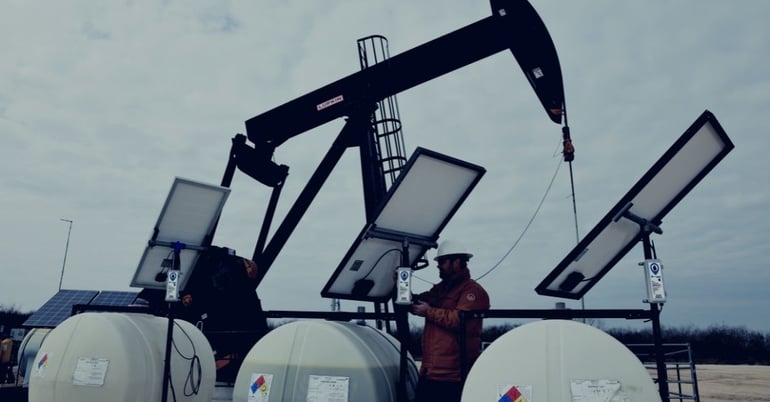
News, Insights, and more on Industrial IoT

Note: To produce this article, dozens of oilfield services stakeholders were interviewed. Due to the highly competitive nature of the oilfield services market, all were interviewed under the condition of anonymity. As such, all names have been fictionalized to preserve that anonymity.
In a 2019 survey of chemical sales & operations managers, 86% of respondents said that “customer service” was their company's main differentiator.
In our conversations with account managers and service technicians, it was clear that many feel they must consistently be out in the field and in front of clients, not necessarily because that’s the best way to solve problems, but simply because they worry about a perceived lack of service coming back to bite them.
But to succeed in 2022 and beyond, chemical sales and service managers will need to reflect on which time-consuming activities add the most value, and focus their attention on achieving outstanding service levels more efficiently.
As the industry has consolidated over the last decade or so, many smaller chemical services vendors that relied solely on field services without generating effective chemical programs have been pushed out or acquired. This isn’t because field work isn’t required, or even desired, but now, more than ever, their performance can be measured much more readily.
Dillon, a young production engineer, remembers how failure meetings looked different in the past, where perhaps chemical account managers could cover for poor performance with good communication and hard work. “Historically, we didn’t really know if we were even close to hitting our recommended PPMs,” he said.
He went on to say that the advent of remote monitoring systems have created new ways to keep track of vendor performance. “Technology is the red flag,” said Dillon. “It tells you if the guys aren’t doing their job. We’ve kind of opened Pandora’s Box. These guys have to be a lot more accountable for what they do.”
Justin, a Chemical Advisor at a large US independent, flatly stated that he doesn’t think chemical service companies can differentiate themselves on service alone. “Service-wise, the majority of chemical vendors are the same,“ he said. “They might do things a little differently, but, you know, a batch treatment is a batch treatment. Continuous treatment deliveries, the inventory process, they’re all about the same.”
Perhaps Justin is oversimplifying the complexities of field work, but at the end of the day, operators care about performance, and performance looks like better asset integrity, better flow assurance, lower failure rates, lower costs per barrel of fluid. And as performance becomes more quantifiable through digital technologies and data analytics tools, the demand for excessive communication and service may dwindle and be replaced by other factors perceived more critical by customers in the industry.

Many oilfield chemical services companies are turning to automation, like tank level monitoring, to eliminate manual processes that aren’t perceived as valuable.
To be sure, service remains a pillar of the business. Everybody acknowledges that field work isn’t going anywhere, at least not in the near future. “We’re in the field all day, every day,” said Colton, an Area Manager in the Midland Basin. “We’re an extra set of eyes in the field for our customers, and that’s something we don’t want to lose sight of.”
He went on to remind those in the industry who don’t perceive field work as valuable that time spent over target is often a critical piece of addressing and solving problems, an important element of the trust that customers desire with their service companies. “It’s kind of a catch 22. To be a problem solver and be proactive you have to do a bunch of field work. You can’t not go to the field.”
Of course, finding problems by getting into a truck takes time and money. It creates safety risks. It inflates carbon emissions. And it takes time away from actually solving the problems that are found.
In this new oilfield, chemical companies will need to think more critically about the processes in the field that actually detract from their ability to provide exceptional service – measured as program performance that leads to better production and throughput for their customers – and find ways to either replace those tasks with automation or reduce their frequency.
Tyson, a district manager in the Gulf Coast, confirmed. “If we could overcome the manual processes, we could allow our people to focus more on solving problems, which is the key.”
This is the critical point: Oilfield chemical service companies who want to win in 2022 need to discover ways to find problems without wasting field hours and truck miles. Instead of using manual observation to catch problems, service companies need to know what problems face them before they head into the field.
And of course, the reason is simple: Chemical companies must focus on what they do best that their customers can’t do well, and that’s chemistry. We'll cover how oilfield chemical services develop better chemistries - faster - in next week's blog.
Want to get emailed when we publish the next article? Subscribe to the blog. (We won't spam you).
Liked what you read? Share this post on social media:
Looking to do more with less in oilfield chemicals? Start here.
Like what you're reading? Sign up for updates!
Have a Question?